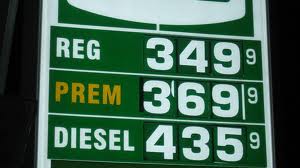Automotive AC Systems - Things You Can Do (And What's Best Left to the Pros)
With the summer months approaching, your car or truck AC system becomes a priority. It has to work well in the hot weather. This is especially true...

There’s lot of power in a name, in what you call something or in how you classify something. If you associate a given name with something good or something bad, you’ll transfer those thoughts over to what you or someone else decide to assign that name to. It's basic human psychology to do that.
 Someone says “I’m going on a diet” – diets are bad, diets imply deprivation and limiting choice. Rarely does that elicit happy, positive thoughts in reaction to it. But if the same person says “I’m making a new lifestyle choice”, well now you think differently about this new journey they’re embarking on.
Someone says “I’m going on a diet” – diets are bad, diets imply deprivation and limiting choice. Rarely does that elicit happy, positive thoughts in reaction to it. But if the same person says “I’m making a new lifestyle choice”, well now you think differently about this new journey they’re embarking on.
The name “fuel additives” has a bad rap, typically associated with “snake oil” and things of that ilk. And there’s a reason for that. Too many times people have purchased something marketed as a “fuel additive” that didn’t meet their expectations. So now all fuel additives are worthless.
In reality, a fuel additive should be called a “fuel supplement”. A supplement is something that adds value to something else in a way we deem important. We take supplements all the time and we believe in their value. Vitamins, minerals, dietary supplements. Workout supplements like creatine and protein powder that we believe contribute meaningfully to improve our exercise routines. As a nation, we spend over $30 billion a year on these, so we must believe they bring us some value.
So, harking back to what we were first talking about, whether you call it a fuel supplement or fuel additive, its value lies in the specific thing you’re looking at. They’re not automatically worthless just because they’re called a “fuel supplement” or a “fuel additive”. They’re good or bad based on what they’re actually are, not just how they’re categorized.
We take a supplement for our bodies or our diet because we believe they add something to us that we’re not getting enough of, otherwise. A fuel additive or fuel supplement simply does the same thing for fuel. A cetane improver is a fuel supplement that supplements or raises the cetane rating of diesel fuel. More cetane means the fuel combusts better in the engine and gives you more optimal power and performance and a smoother running engine.
Multifunction fuel supplements combine multiple active ingredients that increase what the fuel contains in certain areas. They’ll supplement the detergency level of the fuel (so your injectors stay cleaner and your gas mileage doesn’t drop). They may, in the case of an ethanol supplement like Ethanol Defense, improve (supplement) the gasoline’s ability to resist potentially disasterous breakdown from exposure to too much water).
The list can go on and on. Lubricity additives. Fuel stabilizers. Corrosion inhibitors. Biocides. They’re all established chemistries that have proven positive effects when used in fuel.
That’s not to say all fuel “supplements” are the same. It’s not to say they’re all great - not by any means. Just because something claims to be great or makes great promises doesn’t mean it’s true just by making the claims. The whole reason the term “fuel additive” has gotten such a bad rap is because there are plenty of bad ones out there and people have been burned.
But when you’re looking at one as a possibility, examine it on its own merits. There are some good ones out there. When you find one, you’ll know it.
With the summer months approaching, your car or truck AC system becomes a priority. It has to work well in the hot weather. This is especially true...

Is it time to put the old hot rod in storage until spring? Lots of people only own seasonal cars - or they choose to put a car in storage if they...

Following up on our previous post about premium gas containing ethanol (or not), there are lots of people out there who swear by using premium gas....